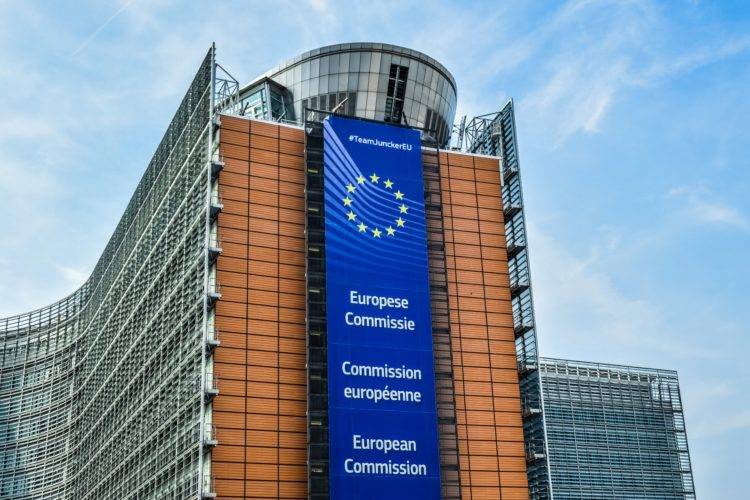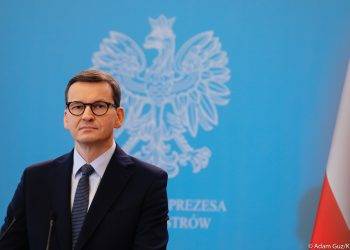The European Commission has officially concluded its Article 7 procedure against Poland, marking an end to a significant chapter in the ongoing tensions between Warsaw and Brussels over the state of rule of law in Poland. The procedure, initiated in December 2017, was prompted by concerns over judicial reforms in Poland that were seen as undermining the independence of the judiciary, initiated by the former Law and Justice (PiS) government.
“The Commission believes that there is no longer a clear risk of a serious breach of the rule of law in Poland, and therefore has withdrawn its reasoned proposal that initiated the procedure in 2017,” stated European Commission spokesperson Eric Mamer following the commissioners’ meeting. “Today’s decision formalizes what was anticipated last week during the meeting of European affairs ministers,” Mamer added, referencing comments made by European Commission Vice President Věra Jourová at that meeting. Jourová had indicated a new, positive assessment by the Commission regarding the state of rule of law in Poland.
The Article 7 procedure, often referred to as the EU’s “nuclear option,” is designed to address serious breaches of the bloc’s core values, including the rule of law, democracy, and fundamental rights. Initiated against Poland in December 2017, the procedure came after a series of judicial reforms by the former Law and Justice (PiS) Polish government, which the European Commission argued posed a serious threat to judicial independence and the separation of powers.
Background and Resolution
The decision to close the Article 7 procedure against Poland follows the European Commission’s announcement on May 6 that it no longer considers the risk of a serious breach of the rule of law by the PiS government to be significant. This announcement was a key factor leading to the formal conclusion of the procedure.
Article 7 of the Treaty on European Union outlines a multi-step process for addressing breaches of EU values. The first step (Article 7.1) involves a determination that there is a clear risk of a serious breach by a member state. If the situation does not improve, the procedure can escalate to Article 7.2, where the European Council must unanimously determine that a serious and persistent breach exists. The final step (Article 7.3) allows for the imposition of sanctions, including the suspension of voting rights in the EU Council.
Poland’s situation reached the first step, with the European Commission arguing that the judicial reforms, which included changes to the appointment and dismissal of judges, compromised the independence of the judiciary. The reforms were part of broader changes introduced by the ruling Law and Justice Party (PiS), which critics argued were aimed at consolidating power and undermining democratic checks and balances.
EU and Poland
The resolution of the Article 7 procedure against Poland highlights the ongoing complexities in the relationship between the European Union and its member states regarding the enforcement of EU values. While the conclusion of the procedure marks a positive development, it also underscores the challenges the EU faces in ensuring that all member states adhere to common standards of democracy and rule of law.
In the broader context, the EU has increasingly focused on mechanisms to uphold these values, including the introduction of a rule of law conditionality mechanism tied to EU budget funds. This mechanism allows the EU to withhold funds from member states found to be in breach of rule of law principles. Poland, along with Hungary, has been a central figure in these discussions, often clashing with the European Commission over the interpretation and implementation of EU values.
The decision to end the Article 7 procedure comes at a time when Poland is navigating its role within the EU amidst broader geopolitical challenges, including the war in Ukraine and the need for unity among EU member states. The Polish government has also faced domestic criticism and protests over its judicial reforms and broader democratic backsliding.
Moving Forward
With the closure of the Article 7 procedure, Poland’s government is likely to face continued scrutiny from both domestic and international observers regarding its commitment to democratic principles and the rule of law. The European Commission has indicated that it will continue to monitor the situation in Poland closely, ensuring that any future actions do not undermine judicial independence or other core EU values.
As the EU grapples with internal challenges and external pressures, the resolution of the Article 7 procedure against Poland serves as a reminder of the delicate balance the Union must maintain in upholding its foundational principles while respecting the sovereignty of its member states. The outcome of this process will likely influence future EU actions in similar situations, shaping the bloc’s approach to governance and rule of law enforcement in the years to come.
The Article 7 procedure was initiated against Poland in December 2017 following judicial reforms that raised concerns about the independence of the judiciary. The European Commission argued that these reforms posed a serious threat to the separation of powers, leading to the activation of Article 7. The decision to conclude the procedure follows a positive reassessment by the Commission regarding the state of rule of law in Poland.


















